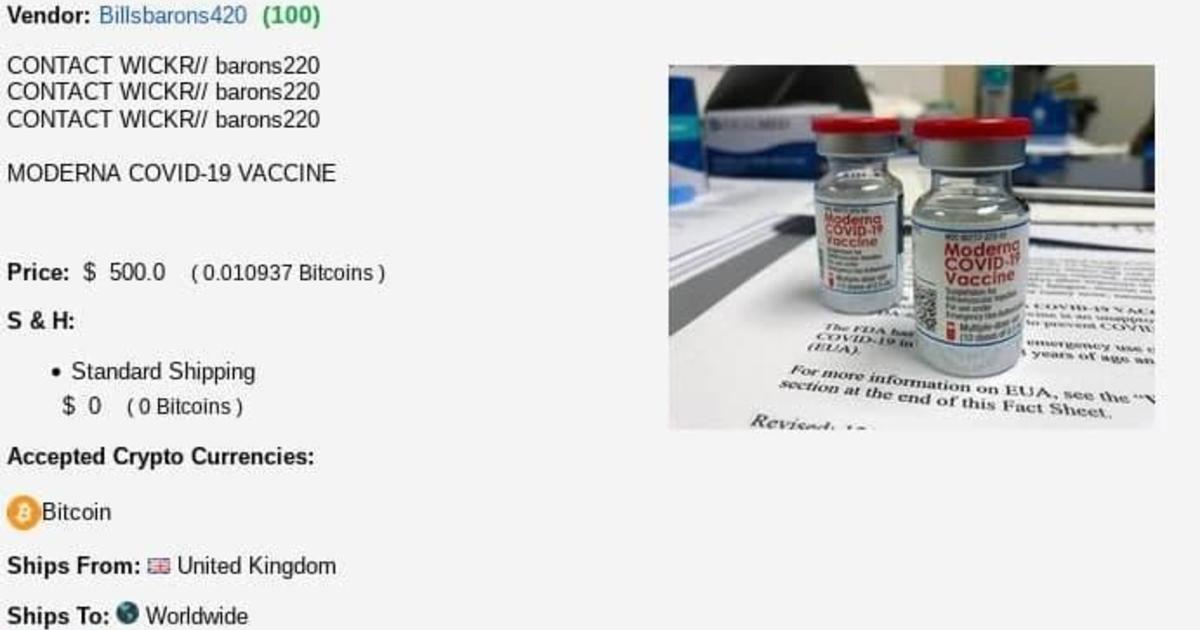Vendors in 15 different dark web markets have distributed hundreds of doses of what they claim to be Vaccines for covid-19, according to a new study by cybersecurity company Kaspersky. Furthermore, Kaspersky researchers believe that a significant part of these sales, up to 30%, may be from real vaccines.
“There is evidence to suggest that some of these vendors are delivering real doses,” said Dmitry Galov, a Kaspersky researcher who led the study of illicit online vaccine sales. “There are pictures of packaging and medical certificates. It seems that some of these people have internal access to medical institutions.”
Doses are available for up to $ 1,200 each, and Kaspersky researchers, who completed their study two weeks ago, say that some vaccine street vendors have completed up to 500 transactions. Galov said that prices have been rising recently and that all sales are conducted in cryptocurrencies, such as bitcoin, which makes it difficult to track them. But at least some of the vendors claimed to be located in the United States, according to the study. Other vendors said they were based in Europe.
Most vendors seemed unsophisticated and were offering only a few servings each. Still, Galov said Kaspersky researchers found at least a handful of vendors who completed hundreds of transactions in what appeared to be real vaccines.
One of the vaccine ads that Kaspersky researchers found stated that it was not selling vaccines, but was accepting donations in exchange for doses. “Your donations will help save more lives, so please show your generosity,” read the offer, which instructed donors to send $ 81 in bitcoin per dose requested in advance, along with a name, address and any medical conditions or illnesses known to get a vaccine shipment. He also said supplies were limited to “we can save more lives as quickly as possible”.
Courtesy of Kaspersky
Lev Kubiak, director of security for Pfizer, told CBS MoneyWatch that the pharmaceutical company found some cases of scammers falsifying the company’s packaging, but no real dose for sale.
“Pfizer proactively monitors the internet, including the dark web, and coordinates with security forces,” said Kubiak. “We didn’t see any real doses sold on the illicit market.”
Kubiak said that Pfizer has been closely monitoring where its vaccines are going. “In the United States, there is no charge to be vaccinated, and the only vaccine that is being sold in the United States is to government agencies,” said Kubiak. “People need to be very careful. From what we can see, there has been no leakage of doses [outside of legitimate vaccination channels]. “
Spokesmen for vaccine manufacturers Moderna and AstraZenca did not return requests for comment.
The problem of whether some vaccines are being sold on the dark web – and whether people are being stolen – has grown. The dark web is the general term used for web pages that are encoded in a way that cannot be found by Google or other search engines and require the use of an “anonymity” browser. Often, web pages are also encrypted.
An academic study published in January found that vaccine offers started popping up on the dark web as early as March 2020. These offers were almost certainly fake.
Last month, Check Point said CBS Chicago the number of vaccine ads on the dark web had grown rapidly in the previous six weeks. But when researchers at that cybersecurity company tried to buy vaccines, the sellers disappeared before the researchers could get any doses.
“Our expectations were low and, of course, they were not met,” Mark Point Ostrowski, chief engineering officer at Check Point, told CBS Chicago.
Kaspersky’s Galov said there are some specialized dark web markets that are invite-only and claim to sell vaccines. But vaccines are also on sale in some of the biggest dark web markets. Galov said that Kaspersky decided not to reveal the names of these markets in its study because it did not want to encourage individuals to try to acquire vaccines on their own.
Also on sale: fake vaccine cards and test results
“It’s more complicated than going to Amazon,” said Galov. “But it is not so difficult that only a specialized engineer can find out.”
Galov said he saw no evidence of regulators trying to crack down on those on the dark web who claim to sell vaccines.
Fake vaccination cards and fake documents claiming that a person has had a negative COVID-19 test are also on sale. Doubtful treatments for the disease are also being promoted, according to the study.
In some cases, vendors claimed that they had created special containers to send doses of the Pfizer vaccine – which must be kept at temperatures well below zero to remain effective.
“Salespeople are trying to prove [the doses] they are not false, “said Galov.” We think that some of them are in fact real. “

